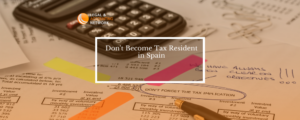HOW TO DEAL WITH DEBTS OWED TO THE TAX AUTHORITIES?
It is important to know the process that the tax authorities are obliged to follow in order to claim and collect tax debts from taxpayers. This will allow you to know the status of the debt, the steps to follow, the available options and the consequences.
WHEN AND HOW IS A DEBT CREATED?
A debt is a tax that has not been paid in due time or form, but it can also be a fine for the non-filing, or late submission, of any tax or informative tax return. That is why the first thing to bear in mind is the presentation and payment deadlines that the Tax office establishes for each of the different taxes.
Throughout the tax year there are different deadlines for presenting and paying the different taxes, this stage is known as the VOLUNTARY PERIOD.
If you are an individual who works as an employee, you should basically consider the deadline for the annual personal tax return (Renta) which is 30th June each year. Until this date, the taxpayer must prepare, submit and pay this tax by direct debit. In this case, the Spanish Tax Office offers two options: a single payment that can be paid by direct debit on 30th June or two interest-free payments that will be charged on 30th June (60%) and 5th November (40%) of the same year. However, there are also other information declarations that should not be forgotten (assets abroad, etc.).
On the other hand, if you are trading as self-employed or as a company, there are many different deadlines for submitting all the tax returns as well as informative declarations that apply in each case (IVA, Retentions, Corporation Tax, transactions over €3,005.06, etc…).
Either way, in all cases, the effect of non-payment or non-submitting is the same: the voluntary period runs out and the EXECUTIVE PERIOD begins. During this period, the taxpayer knows that he has a tax debt, but the tax office has not notified him yet. In addition to the amount of the tax, the taxpayer must pay a percentage, 5, 10 or 20%, depending on the time that elapses between the end of the voluntary period and the date of the actual payment, as long as the Tax Office does not notify the outstanding debt.
As soon as the tax office becomes aware of the debt and claims it by means of a reliable notification, they will urge the taxpayer to pay it, granting a new deadline for payment. In the event that this new deadline is not met, the Tax Office will initiate the PROCEDIMIENTO DE APREMIO and will issue a “Providencia de Apremio”, in which any property in the taxpayer’s name is seized until the total amount of the tax debt, the interest generated and the costs of the legal proceedings are covered.
The taxpayer should be aware that he can only oppose the enforcement procedure if he is in one of the following situations:
- The debt has already been paid
- The right to demand payment of the debt is time-barred.
- A request for deferment, instalments or compensation has been submitted during the voluntary period.
- The tax authorities have not sent notification of the debt
- An error has been omitted or there is an error in the information on the writ of assessment that prevents either the identification of the taxpayer owing the debt or the identification of the debt itself.
In any case, the taxpayer should be aware of the type of property that can be seized by the tax authorities:
- Money in bank accounts
- Short-term receivables or realisable securities (e.g. shares maturing in less than 6 months)
- Salaries or pensions
- Property (real estate)
- Interest or income derived from a commercial, industrial or agricultural activity
- Jewellery, antiques and precious metals.
- Movable property
- Long-term receivables or realisable securities (e.g. shares maturing in more than 6 months)
- Commercial or industrial establishments
WHAT DO I DO IF I HAVE A DEBT WITH THE TAX AUTHORITIES AND I DON’T HAVE ANY MONEY?
It is necessary to know all the available options in the event of not being able to pay a debt. Depending on the status of the debt, the taxpayer may have more or less alternatives:
Mainly, the taxpayer will be able to request a deferment and payment in instalments. The first thing to bear in mind is that this option will only be available for debts in the voluntary or enforcement period. Therefore, this alternative will not be viable if the Tax Office has already notified the taxpayer of the levy or seizure procedure.
In addition, it is necessary to submit a request stating the economic-financial difficulties that prevent payment of the debt on a temporary basis, as the Tax Office will not grant deferrals when it considers that a taxpayer will not be able to comply with a payment plan. Likewise, we must consider the limit on the number of instalments that can be requested in each case, 12 months for everyone except companies for which the limit is 6 months.
It should also be noted that there are debts that cannot be deferred, such as those cases in which the taxpayer is obliged to withhold or make payments on account. In these cases, the request will be denied and the tax authorities will grant a new deadline for payment.
In addition, once the deferral of the debt has been granted, the tax office will send an informative letter detailing the dates on which the instalment is going to be charged and the amount to be paid. In addition, interest will be added and they will be calculated on a daily basis from the end of the voluntary period until the effective date of payment.
IS THERE A STATUTE OF LIMITATIONS PERIOD FOR THE TAX DEBT?
To answer this question, we must refer to article 66 of the General Tax Law, which establishes the duration of debts owed to the Tax Office.
“A tax debt is time-barred after four years from the day following the day on which it ends from the day following the end of the regulatory period for filing the tax return or self-assessment for filing the tax return or self-assessment. However,
the period shall be interrupted if the administration initiates any investigation or claim action beforehand investigation or complaint beforehand”.
Therefore, as a general rule, the debt will be written off within 4 years as long as the Tax Office does not proceed to claim it beforehand, which nowadays, due to all the technological advances, is quite improbable. There are more and more control mechanisms that make it difficult for the taxpayer to remain unpunished in the face of a fraudulent act.
WHAT IF THERE IS A TAX OFFENCE?
If the failure to pay exceeds €120,000, the taxpayer will have committed a tax offence and the picture changes radically.
If this is the case, the statute of limitations is 5 years, and if the debt exceeds €600,000, the statute of limitations is 10 years and the judge may impose prison terms of between two and six years.







